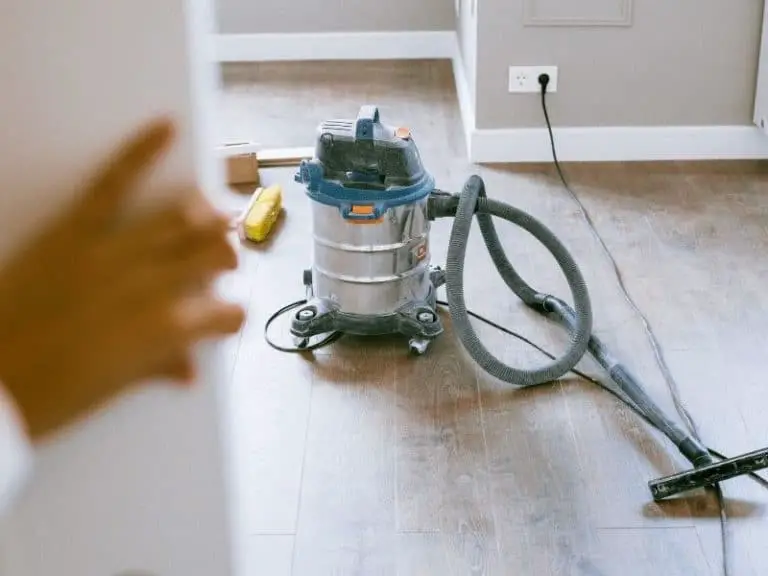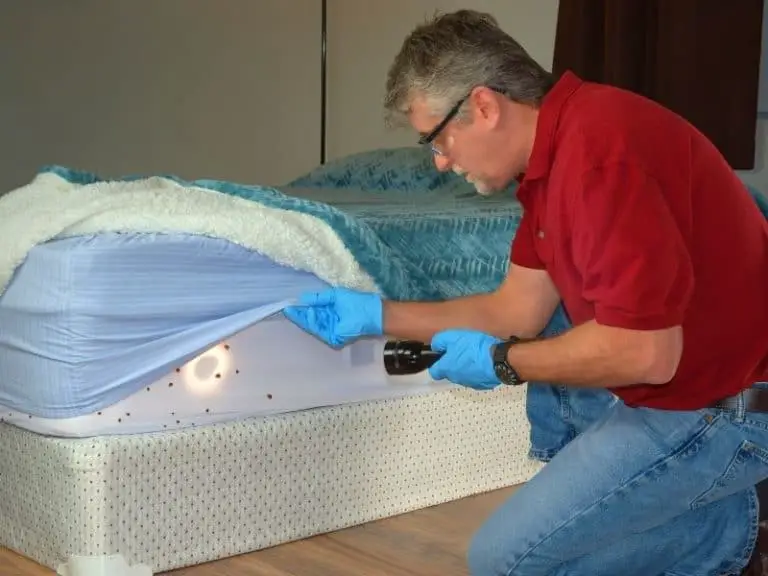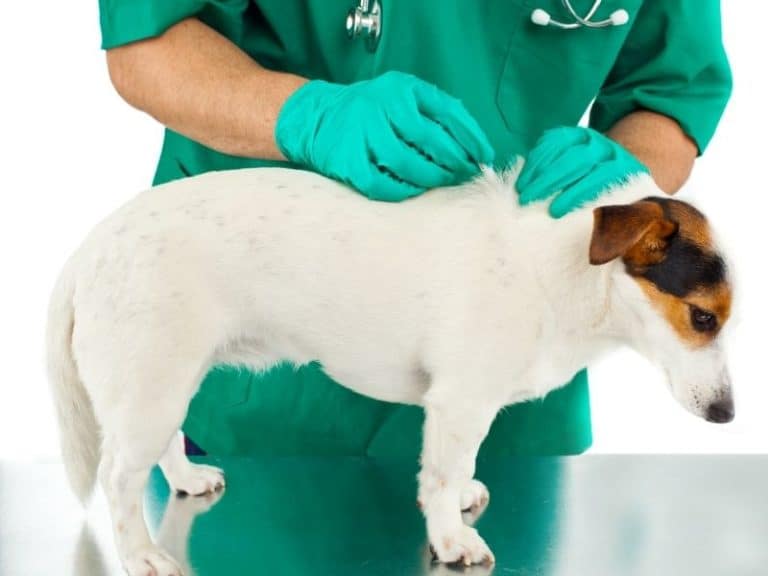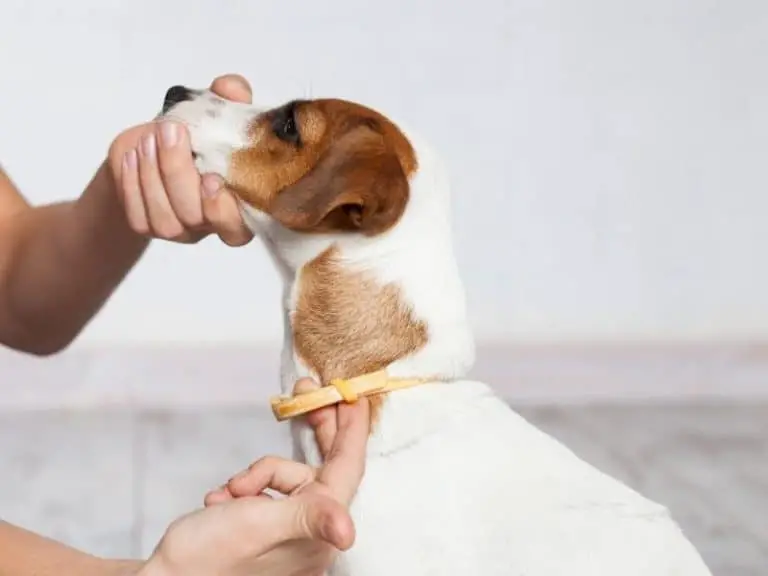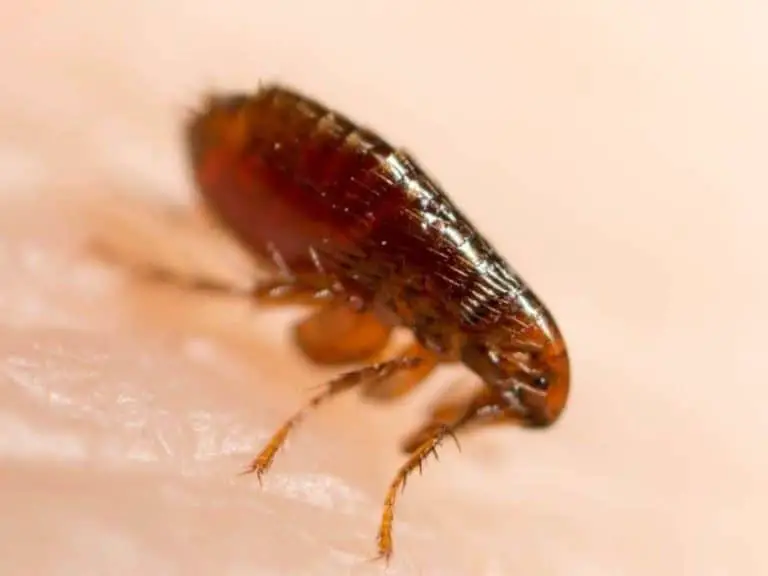Can Humans Carry Fleas From One Home to Another?
Fleas do not live on humans. Even if they try, they can’t — unlike cats and dogs, humans do not have enough hair that fleas need for protection and egg-laying purposes. However, fleas can feed on human blood. They can also attach themselves to their clothes and move from one place to another.
Humans can carry fleas from one home to another. Fleas can latch onto their skin and clothes. This is most especially true if a viable host, such as a cat or dog, isn’t around. In some instances, humans can get fleas by accident, such as by sitting or lying on infested furniture pieces or surfaces.
There are a couple of problems that can stem from fleas winding up on your skin or clothes.
First, they may bite you to drink your blood. This may put you at risk of having skin irritation or a health problem fleas are known to spread through their bites.
Second, fleas may end up infesting your home and your pet, if you have one.
Below, you will come across some of the most important matters about how those tiny blood-sucking creatures travel from place to place.
Fleas are Very Good Jumpers
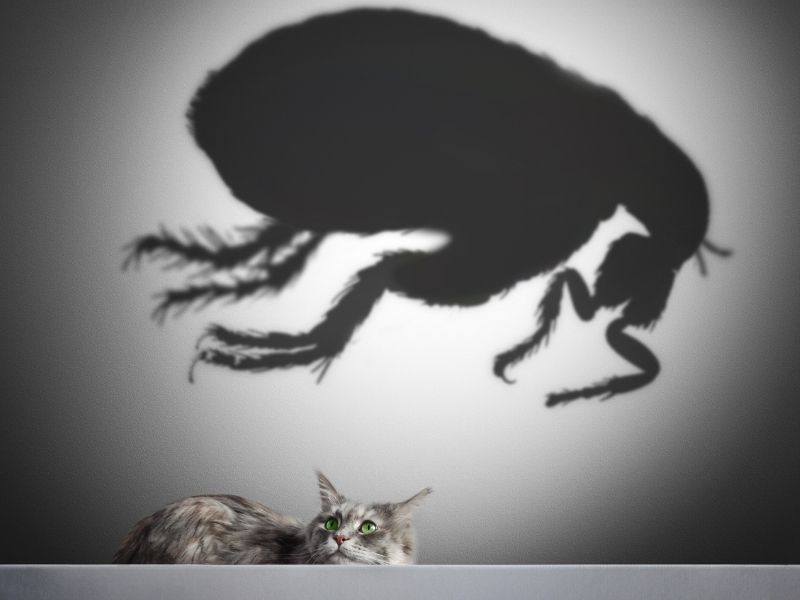
The absence of wings does not stop fleas from spreading without trouble.
Even though they cannot fly like mosquitoes, moths, and other winged common household pests, fleas can jump — and they can do so extremely well.
In fact, fleas are known to jump as far as 13 inches. That’s about 200 times their body size!
Because they have strong and powerful legs that enable them to jump really far, they find it easy to move from one host to the other.
This is especially true if they are sharing their current host with a lot of other fleas.
Unfortunately, jumping does not allow fleas to move from pet to pet only. It also lets them move from an animal (or a piece of infested furniture) to a human.
Fleas live off blood.
It doesn’t matter if it’s the blood of a cat, dog, or person. For as long as it’s the blood of a warm-blooded living thing, fleas will be more than happy to drink it for sustenance.
How much blood do fleas drink?
Fleas can drink up to 13.6 microliters of blood a day. That’s equal to 0.000460 ounces daily. While small, fleas can drink blood amounting to about 15 times their body weight. It may not sound enough, but a hundred fleas can drink nearly half an ounce of blood a day — three and a half ounces a week.
But fleas like to drink your furry pal’s blood more than yours. No, it has nothing to do with the taste or composition of the blood.
It’s all about the fact that the body of your cat or dog provides fleas with a more ideal environment.
If you want to know why fleas prefer your pet’s blood to your blood, keep on reading.
They Drink Human Blood Alright, But…
Just because fleas are associated with cats and dogs doesn’t mean that they won’t drink your blood. Believe it or not, fleas find human blood as delightful to drink as the blood of pets.
However, there is something about you that makes fleas gravitate more toward consuming the blood of your pet rather than your blood.
It’s none other than the fact that you are not as hairy as your meowing or barking buddy.
Besides blood, fleas also need to live in the perfect environment for them to survive and multiply. Giving fleas and their eggs, too, the protection and warmth they need is the furry body of a cat or dog.
What fleas love about your pet is that its fur can keep them feel safe and protected. The longer and thicker the fur, the better!
Staying out of harm’s way is not the only reason why fleas prefer to live on pets. The bodies of hairy animals also provide fleas with their preferred temperature of 70°F to 85°F.
However, fleas can live in cooler and warmer temperatures, too. But they are not very good at tolerating extremely low and high temperatures. For instance, fleas will die when the temperature drops lower than 48.4°F and climbs higher than 95°F.
In a few, we will talk about how you could use heat to control a flea infestation — so don’t stop reading now.
But even if you have lots of hair, your body is not enough to provide fleas with the protection and warmth they want. Despite this, if fleas are given the opportunity or desperately hungry, they will bite you and drink your blood.
And, in some instances, fleas may also take advantage of your body to get from one place to the other.
How long do fleas live on animals?
Fleas on short-haired cats and dogs can live up to two weeks only. On the other hand, fleas on long-haired cats and dogs can live longer. If the conditions are ideal for them, fleas can live for up to one year. Fleas can live on human blood. However, it can prevent them from mating and laying eggs.
Speaking of laying eggs, adult female fleas can lay viable ones only if two conditions are met. First, they should be feeding on the blood of their host. Second, they should be living on a host that offers them a suitable living environment.
Based on a laboratory study, fleas would have to feed on human blood for 12 hours non-stop to lay viable eggs.
Otherwise, they would fail to mate to produce eggs or lay eggs that would hatch into baby fleas.
However, it is unlikely for a flea to drink your blood for 12 straight hours. That’s because you will surely feel and remove it.
Here’s an interesting fact: Without a host or if the living conditions aren’t right, fleas can only live for up to two weeks. On the other hand, young fleas can live up to nine months without feeding.
Flea larvae and pupae can live for several months without a blood meal. To survive, they enter a dormant stage where they eat just about anything organic, from human hair to the poop of adult fleas.
When they are stimulated by vibrations or warmth, which could signify the presence of a host, young fleas become adults.
However, upon becoming adults, fleas should eat blood within a couple of days. Otherwise, they will die. Unfortunately for new adult fleas, they can no longer return from being dormant critters.
How Fleas Travel From Place to Place
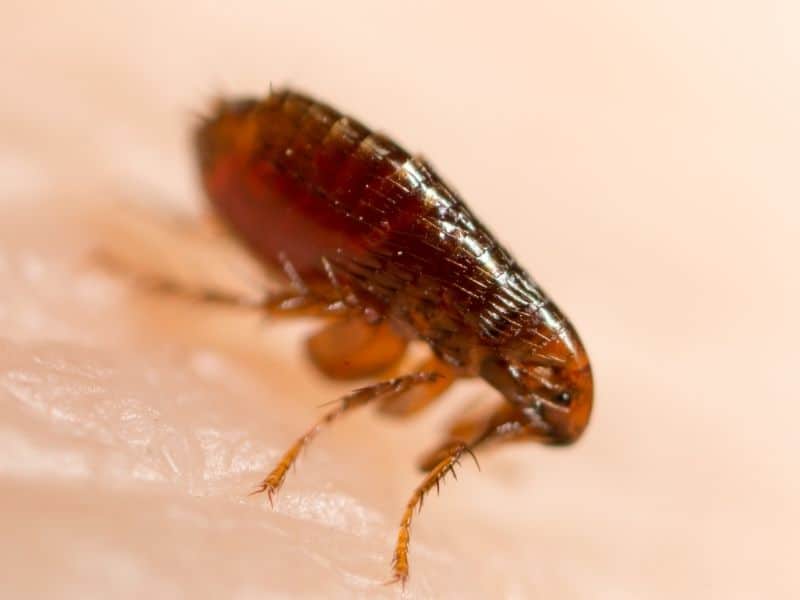
It was mentioned earlier that fleas are very good at jumping. They are so good at it that they can cover a distance of up to 13 feet. That’s quite impressive given the fact that fleas are just the size of a sesame seed.
Besides jumping, fleas can travel by hitching a ride. These tiny blood-drinking creatures can hitch a ride on both pets and you.
Even though you are not as hairy as a cat or dog, the clothes and shoes you are wearing make it trouble-free for fleas to latch onto you until such time they locate a more suitable host.
Due to this ability of fleas, humans can carry fleas from one home to another easily and without their knowledge!
Your pet and the entire home, too, can be in grave danger if you visit the infested home of a family member or friend.
Some of the fleas (even eggs, larvae, and pupae) may end up attached to your socks, pants, jacket, or the seams of your sneakers.
And when you get home, they may get dislodged and end up in places in which they may nest.
Having a cat or dog can quickly lead to disastrous results — your pet provides fleas from someone else’s home the perfect meal and living conditions, too.
Unfortunately, fleas can hitch a ride on many other things than your clothes. Some of them are:
- Pet beddings and toys
- Furniture pieces
- Mattresses
- Carpets and rugs
- Pillows and pillowcases
Once an infested item (any of the ones mentioned above) is already inside your home, fleas hiding in it are likely to explore your home by crawling and jumping — again, fleas are phenomenal jumpers.
It is likely for them to end up hiding where they feel more at home, such as your cat or dog.
Needless to say, you should be very careful when shopping for items at garage sales, secondhand stores and flea markets, as you may end up welcoming fleas into your home!
Can I get fleas from hotels?
It is very much possible to get fleas from hotels. This is especially true if the hotels are pet-friendly. Because fleas are very good jumpers, they can jump into suitcases and others in which they can hide. If the conditions are right, fleas can survive for a while until a blood meal is around.
Some of the most common pests found in hotels are bed bugs. Unfortunately, those blood-sucking bugs do not stay in hotel rooms for good.
It is possible for some of them to wind up in your luggage and later introduced into your home!
Besides bed bugs, fleas are other insects that you can get from hotels. Especially if you book where pets are allowed, your chance of bringing home some fleas is high.
If staying in a pet-friendly hotel during a trip — whether for business or pleasure — is the only option, choose a reliable one that regularly inspects and cleans its rooms.
But fleas in a hotel room need not necessarily jump into your suitcase to invade your home. Again, as mentioned a few times earlier, fleas can attach themselves to your clothes or shoes, thus using you as some sort of a vehicle.
If you travel a lot and fear that you might bring home some fleas, read on. In a few, you will find some helpful tips and tricks on keeping your home off-limits to fleas from other places.
Can I have fleas even if I don’t have pets?
Having fleas is very much possible even without cats or dogs around. For instance, rats and mice can transport fleas into the home when they invade it. Squirrels, skunks, raccoons and opossums may also leave behind fleas, adults or eggs, when they spend time in the attic, basement or crawl spaces.
Refrain from assuming that you don’t have to worry about fleas because you don’t have a pet. Whether or not you are taking care of a pawed pal, fleas may invade your home and bite and drink your blood.
Does your neighbor have a pet that seems to be scratching all the time? Then there is a possibility that it has a nasty flea infestation.
Some of its fleas may end up in your home by crawling or jumping.
Some of them may get indoors by hiding in your clothes, furnishings, plants, and other items located outside that you will transfer inside afterward.
The bottom line: Having no pet does not make your home impervious to fleas!
How to Not Bring Fleas Home
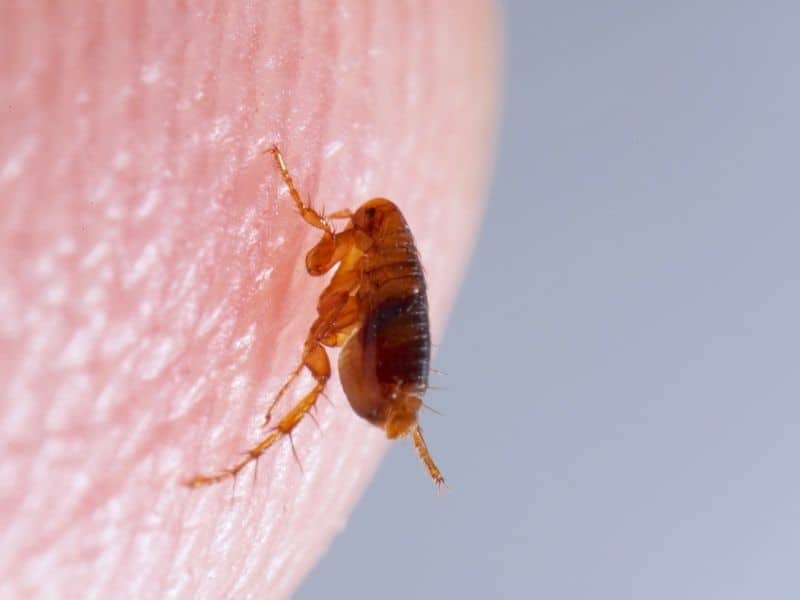
We have now come to the most important part of this article. It’s none other than the steps that you may take to prevent bringing home fleas from elsewhere.
Knowing the things you need to do to prevent a flea infestation is crucial. This is especially true if you have a pet that you wish to protect from incessant scratching.
Keeping fleas out of your home is not only good for your pet but also the well-being of you and your family — fleas can spread health problems through their bites or excrements!
Steer clear of secondhand items
Cats and dogs may be the preferred hosts of fleas alright. However, fleas can nest in various places while they are not feeding or an animal that can provide them with their blood meal isn’t around.
Fleas can hide in all kinds of furniture pieces.
They especially love upholstered ones and those with cushions. Fleas can also hide in carpets and rugs, and many other things that are out of fabric.
Because of this, it’s a good idea to avoid installing in your home secondhand items that may be infested with fleas.
Avoid visiting infested homes
It was mentioned earlier that fleas could latch onto you by means of your skin, clothes or shoes. Fleas may attach themselves onto what you are wearing when you come into contact with adult ones.
You may also end up with a flea infestation in your home if you come into contact with flea eggs while you are in an infested home.
Inspecting every surface and nook and cranny in your family member or friend’s home with a magnifying glass can be both rude and weird. If the homeowner has a pet that cannot seem to stop scratching, be wary.
Book with reputable hotels only
Besides an infested home, it is also possible for you to run into fleas while staying in a hotel. This is especially true if the hotel allows its guests to bring their pets with them.
The problem with pet-friendly hotels is that the management does not ask their guests if the pets they are going to share their rooms with are free of fleas.
To considerably lower your risk of bringing home fleas, stay in a hotel that does not welcome pets. But still, this is not a 100% guarantee that you will never come across a flea.
Wash clothes in hot water right away
Like many common household pests, fleas are unable to survive high temperatures. This is why immediately washing your clothes before entering your home is a great idea.
Fleas will die when they come into contact with water that’s greater than 95°F. Since clothes can shield them from high temperatures, aim for about 130°F.
Worry not if washing your clothes in hot water right away is not an option. That’s because you may seal them in a plastic bag and wash them some other time. Or you may give the next tip a try.
Spray diluted essential oils
There is another solution that you may give a try if you cannot head straight to the washing machine upon arriving home. It’s reaching for a bottle of diluted essential oil that fleas hate and spraying it on your clothes.
Some essential oils can kill fleas.
Two of the best are cedarwood essential oil and clove essential oil. Other essential oils can repel fleas only. Still, they can help fend off a flea infestation.
Some examples include lavender essential oil, thyme essential oil, basil essential oil, lemongrass essential oil, peppermint essential oil, and rosemary essential oil.
Count on an all-natural flea spray
Instead of using essential oil that can kill or repel fleas, you may also apply a flea spray. You can get your hands on a bottle of it by visiting a veterinary clinic or pet supplies store.
What’s really nice about this product is that you can use it to deal with fleas not only on your clothes but also on your pet and its belongings.
When shopping for a flea spray, make sure that it contains natural ingredients only. It’s also a great idea to opt for one with a nice smell so that you won’t have a hard time using it in or around your home.
Just Before You Bring Home Fleas Unknowingly
So, can humans carry fleas from one home to another?
They certainly can! But the good news is that it doesn’t have to end with you having a pet infested with fleas.
Similarly, it doesn’t have to lead to a home serving as a nesting place for fleas. There are many things that you may do to keep a flea infestation from striking.
Especially if you have a pet, an excellent way to prevent a flea infestation is by asking a veterinarian for the best oral or spot-on flea product for your cat or dog.
Keeping your home clean and clutter-free is also recommended.
Photo credit: ©canva.com
Medical Disclaimer: TheHomePestControl is a digital publisher and does not offer personal health or medical advice. The contents of this website are not intended to substitute for professional medical advice, diagnosis, or treatment.
Affiliate Disclaimer: As an Amazon Associate, I earn from qualifying purchases made on our website. If you make a purchase through links from this website, I may earn a commission at no additional cost to you.

